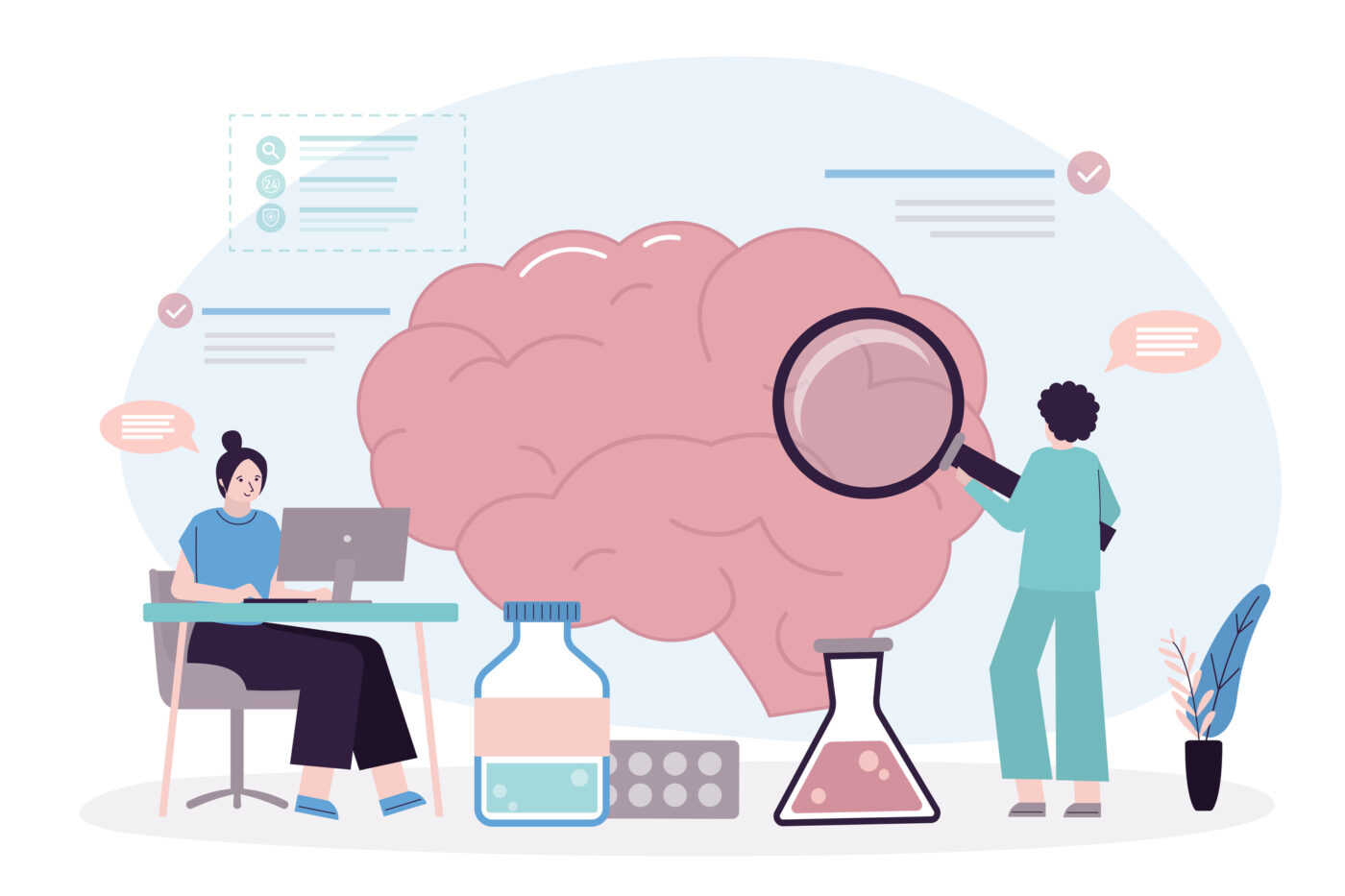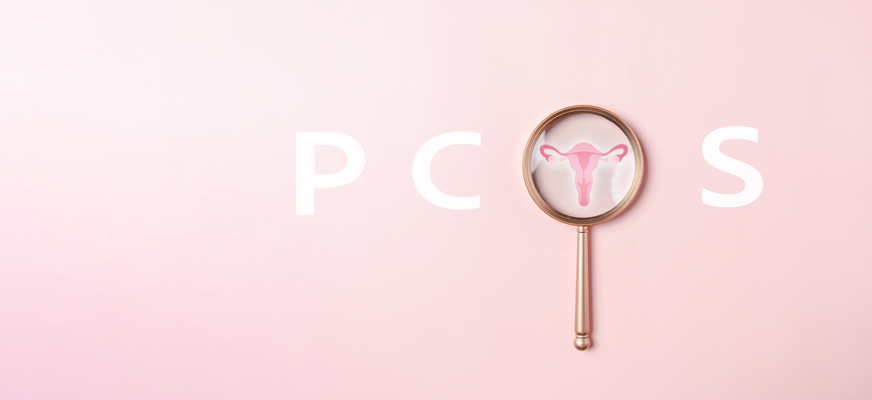Ketogenic Diet: What To Eat & What To Avoid
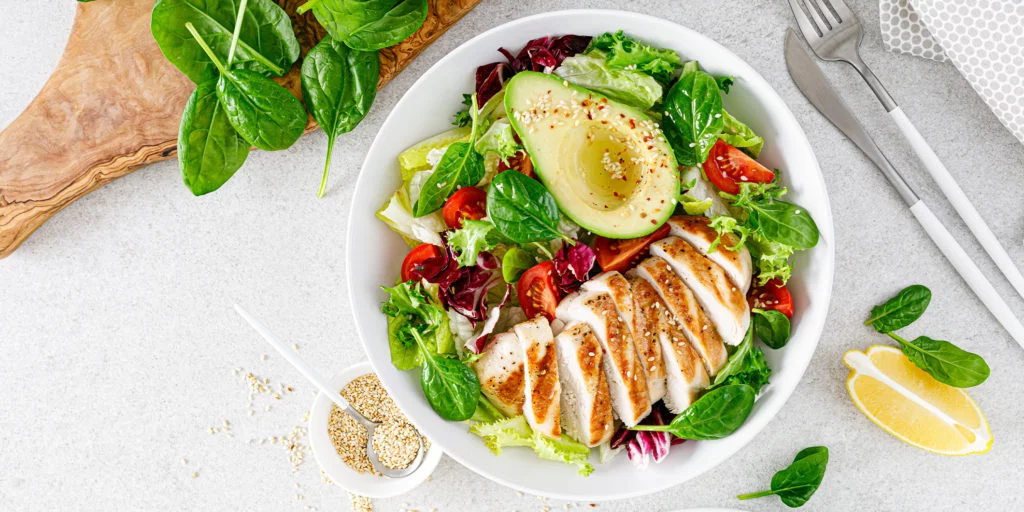
In this guide you will find what to eat, and what to avoid on the ketogenic diet. Although some of the rules may seem very restrictive and difficult to you, following a low-carb, high-fat lifestyle is easier than you think.
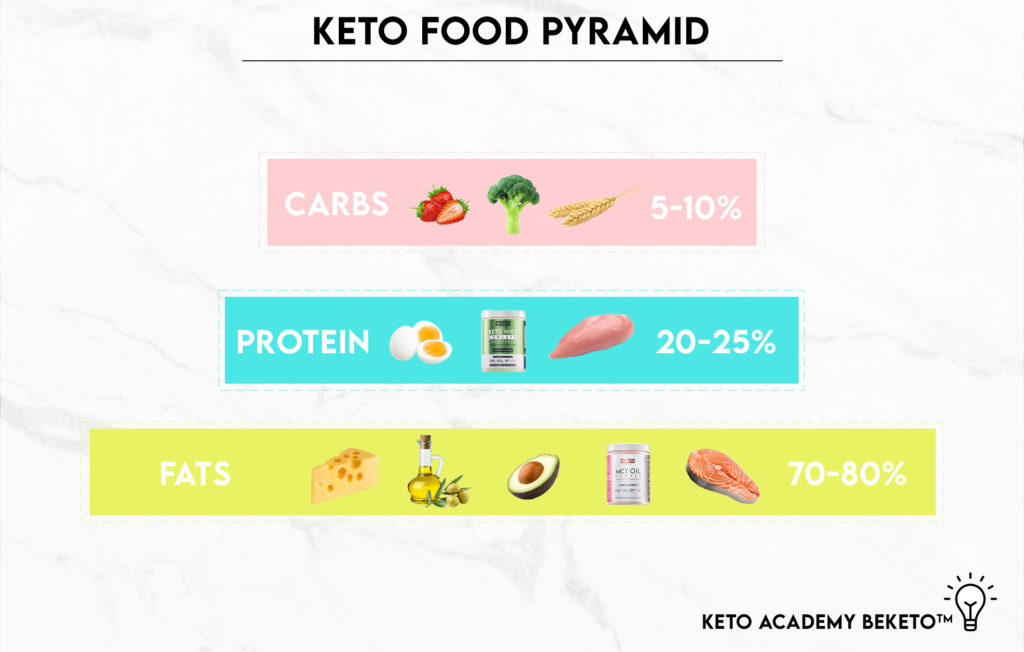
What Can I Eat On Keto?
If you are not sure what to eat on the ketogenic diet, here is a quick reference list:
Meat
Low-carb, unprocessed meats are a staple on keto. It is important to remember that the ketogenic diet is a low-carb, moderate-protein and a high-fat diet. Too much meat can mean too much protein – thus, tracking your macronutrients is necessary to remain in ketosis. This is because an excess of protein can be converted into glucose, which will stall your body’s ability to reach a nutritional level of ketosis and obtain the desired results you want.
Here’s a list of the most commonly consumed meats:
- Chicken breast
- Chicken thighs
- Turkey breast
- Minced turkey
- Ground beef
- Steak
- Loin
- Liver
- Bacon
If you would like to find out the nutritional values of each, click here.
Fish & Seafood
Both fish and seafood a great source of essential fatty acids (omega-3), quality protein and vitamin D. Because of their low-carbohydrate count, they are perfect on the ketogenic diet.
Recommended fish and seafood on the ketogenic diet:
- Salmon
- Mackerel
- tuna
- herring
- Cod
- Shrimp
- Crab
- Lobsters
- Mussels
Healthy fats
Most of your daily calories on the ketogenic diet come from fats. Whether this fat is obtained through consumption of meat, fish, eggs, dairy or oils, it is necessary for you to remember that healthy fats will always be a better option than unhealthy, processed foods. While these may still help you in reaching a state of ketosis, they are not recommended on the ketogenic diet.
To help you understand the difference in fats, check out this guide:
- Saturated Fats: Red Meat, Eggs, Grass-Fed Butter, Coconut Oil, MCT Oil
- Monounsaturated Fats: Lard, Bacon, Fatty Fish, Olive Oil, Avocado Oil, Nuts, Chia Seeds
- Polyunsaturated Fats: Fish Such As Salmon Or Mackerel, Nuts, Avocados, Flaxseed Oil, Extra Virgin Olive Oil. Be Aware, That Not All Polyunsaturated Fats Are Healthy.
- Trans Fats: You Must AVOID These Chemically Altered Fats Completely. Check Nutrition Labels Often To Find Out If A Product Contains Trans Fats.
Ideal foods containing healthy fats are:
- Avocados
- Egg yolks
- fatty fish
- animal fat
- lard
- Butter
- Ghee
- Mayonnaise
- Coconut Oil
- MCT Oil
- Coconut butter
- virgin olive oil
- avocado oil
- Nuts
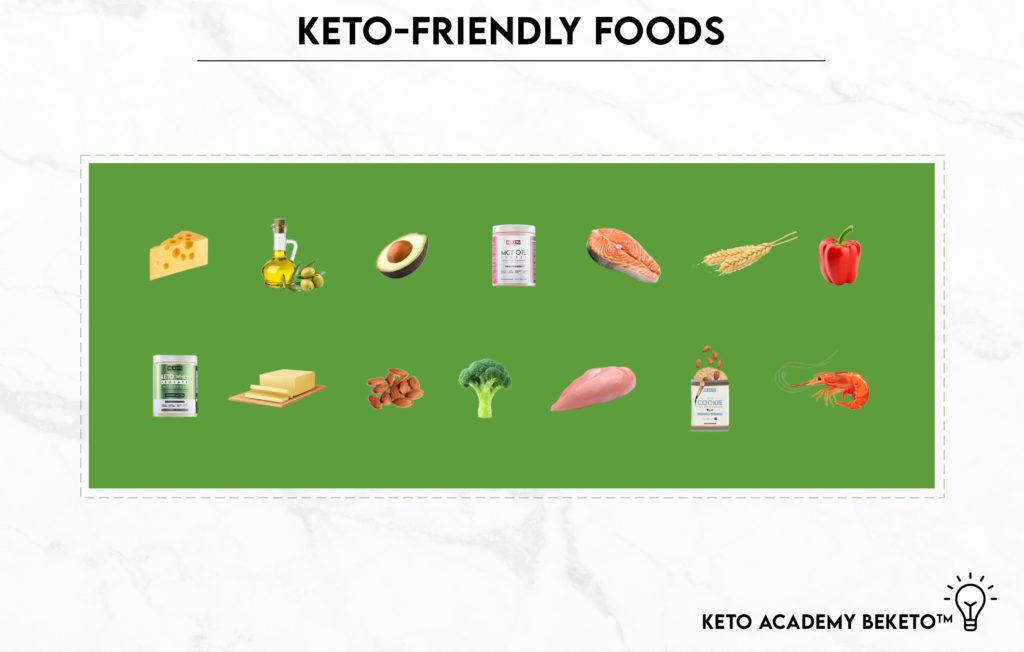
Eggs
Scrambled, hard-boiled, sunny side-up, poached – on keto, you can eat all types of eggs, in all shapes and forms. Pastured organic eggs are your best choice.
Dairy
Dairy is a great way to increase your fat intake on the ketogenic diet. However, it is important to remember that not all dairy is created equal. A lot of products such as yogurts contain hidden carbs and may not be suitable for the ketogenic diet. It is best to check the nutritional label of dairy products before purchasing.
Also, many ketogenic diet veterans found that excessive use of dairy may stall weight loss. If this is the case, you may want to limit or completely eliminate your dairy intake for a short period of time to see if that method works for you.
Here are the most popular dairy products:
- Butter
- Greek yogurt
- all kinds of cream
- cottage cheese
- ricotta
- Mascarpone
- Cheddar
- Parmesan cheese
- Brie
Note: You may be surprised to find out that milk is not on this list. One glass of milk contains 12g of carbohydrates. Instead, opt for nut-based milks such as almond milk or cashew milk. If these are not your favorite, you may want to consider coconut milk as well.
Low-carb vegetables
One simple rule in regards to the vegetables allowed on the ketogenic diet is to eat what grows above the ground. Easy, right?
- Leafy greens such as kale, spinach and various types of lettuce
- cabbage
- broccoli
- Cauliflower
- Cucumber
- Zucchini
- eggplant
- Peppers
- Mushrooms
- Onions
Note: Beware of nightshades, such as eggplants, peppers and tomatoes. They are known to contain a chemical called solanine, which may cause inflammation and irritate those with arthritis.
Nuts & seeds
Full of healthy fats, nuts and seeds are a great food option. But beware – snacking on a large amount of these can increase your caloric consumption and sabotage your final goals. In addition, some nuts and seeds have a higher carbohydrate count than others.
Notice there is no pistachios and cashews on this list – this is because 100g of pistachios contain 18 grams of net carbohydrates. Most of the time, that’s almost all of the carbohydrates you are allowed to eat within a day!
Low-carb fruits
This may be one of the most controversial foods to eat on the ketogenic diet. Which fruits are low-carb? Different guides show a variety of fruit you can eat. However, we recommend berries to be your best option, such as raspberries, blueberries, blackberries and strawberries.
Berries do not spike your blood sugar, which helps reduce cravings and curb your appetite. Also, it is important to note that the higher fiber count, the less net carbs you will eat.
Remember: Low-carb fruits are meant to be eaten with moderation. Think of them as a dessert.
Drinks
- Water – Whether It’s Flat Or Sparking, Water Is Your Best Option. If You Prefer Flavored Water, You May Add Slices Of Cucumber, Lemon Or Lime, Which All Have Detoxifying Properties. During Your First Few Days Of The Ketogenic Diet, You May Want To Add Half A Teaspoon Of Salt Or Mix Your Water With BeKeto™ Electrolytes To Reduce Symptoms Of Keto Flu.
- Tea – White Tea, Black Tea, Green Tea, Breakfast Tea Are All Keto-Friendly. However, Watch Out For Fruit Teas – These May Contain Dried Fruits And Unwanted Sugars Which Will Result In Additional Carbohydrates.
- Coffee – Haven’t You Heard Of Bulletproof Coffee Yet? It Is The Most Popular Way To Drink Coffee On The Ketogenic Diet!
What foods should I avoid?
Sugar
Did you know that most of your cravings are caused by sugar? Avoid cookies, cakes, chocolate bars, ice cream and donuts at all costs. Even the smallest amount of sugar can kick you out of ketosis and halt your progress on the ketogenic diet.
Also, beware of hidden sugars and carbs in keto-friendly foods, such as mayonnaise or beef jerky. Most of the time they are loaded with sugar, therefore it is best to double-check all nutritional labels.
There are alternative options to sugar on the ketogenic diet, such as erythritol, stevia, monk fruit sweetener and xylitol. They do not have a significant impact on your blood sugar level, therefore they will not cause insulin spikes.
Starches
Avoid bread, rice, pasta, grains like quinoa and bulgur, potatoes, french fries etc. All of these foods are loaded with carbohydrates and will not allow you to enter ketosis. Whole-grain products are off-limits as well.
Recently, there has been a surge in seemingly keto-friendly products in the food industry. Everything from low-carb keto tortillas, to low-carb keto bread. Make sure to read the ingredients and calculate net carbohydrates on your own to see if these products fit within your daily macros. Beware of false advertising and marketing tactics to make you believe junk food is ketogenic.
Foods like beans and legumes are also not permitted on the ketogenic diet. Although you may miss the taste of bread or pasta, there are a lot of keto alternatives to popular, high-carb foods such as zucchini pasta, mashed cauliflower, cauliflower rice and bread substitutes baked with keto-friendly almond flour and coconut flour.
Unhealthy fats
Not all fats are created equal and their consumption is by far the most controversial part of the ketogenic diet. While “dirty keto” may get you into ketosis, it doesn’t mean that it is healthy for you. Above all, completely avoid trans fats, which are chemically hydrogenated fats found in many processed, shelf-stable foods.
Opt for healthy sources of fats such as extra virgin olive oil, coconut oil, MCT oil, flaxseed oil, lard etc. Avoid processed foods with unhealthy oils such as grapeseed oil, canola oil and sunflower oil.
In order to see which fats are your best option on the ketogenic diet, click here.
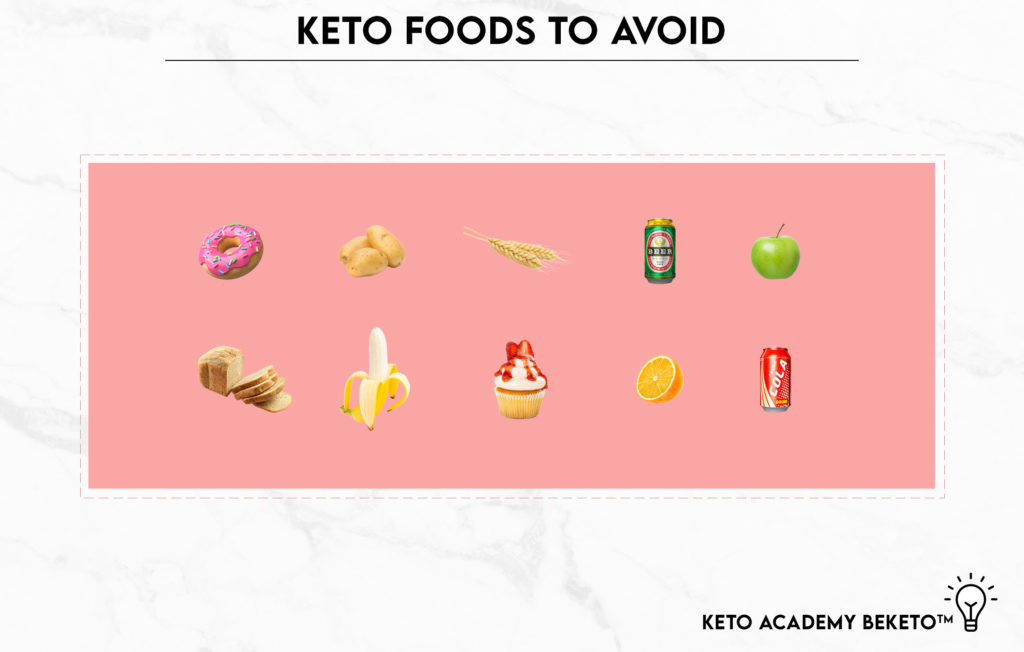
Certain vegetables
Unfortunately, you cannot eat all the vegetables you want. Most of them are loaded with carbohydrates, making them unsuitable for the ketogenic diet. Potatoes, sweet potatoes, corn, squash, beets and other root vegetables are to be avoided. While you can add carrots and parsley root to your broth, they are to be eaten in moderation.
Fruits
Fruits are known to be the Earth’s dessert. They are also high in natural sugars and high in carbohydrates. Aside from an occasional treat which includes berries, fruits are not allowed on the ketogenic diet. This means no bananas, apples, pears, plums, melons etc. Citruses should be avoided as well, with the exception of small amounts of lemon and lime (for example, in tea or water).
Drinks
Avoid drinks with sugar, such as soda, fruit juice, energy drinks like Monster or Redbull, compotes and other sugar-containing liquids.
- Alcohol
Most of the time, you should abstain from drinking alcohol on the ketogenic diet altogether. Although some alcohols have a lower carbohydrate content than others, such as gin or vodka, your body will first grab onto alcohol in your blood to metabolise it, forgetting about burning through fats. Once you consume alcohol, your body will not think of fat as a priority anymore.
P.S. Have a look at our printable Complete Keto Food List available in PDF form.
